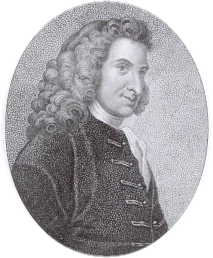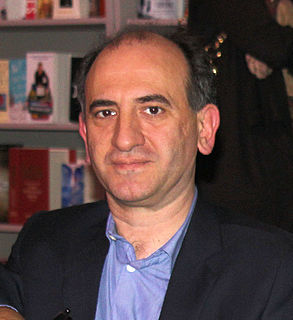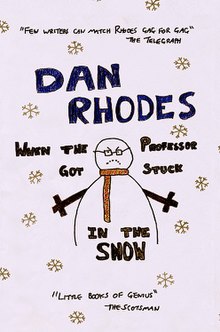
Henry Fielding was an English novelist and dramatist known for his rich, earthy humour and satirical prowess, and as the author of the picaresque novel Tom Jones. Additionally, he holds a significant place in the history of law enforcement, having used his authority as a magistrate to found what some have called London's first police force, the Bow Street Runners. His younger sister, Sarah, also became a successful writer.

Dirk Gently's Holistic Detective Agency is a humorous detective novel by English writer Douglas Adams, first published in 1987. It is described by the author on its cover as a "thumping good detective-ghost-horror-who dunnit-time travel-romantic-musical-comedy-epic".

Armando Giovanni Iannucci is a Scottish satirist, writer, director, and radio producer. Born in Glasgow to Italian parents, Iannucci studied at the University of Glasgow followed by the University of Oxford, leaving graduate work on a D.Phil about John Milton to pursue a career in comedy. Starting on BBC Scotland and BBC Radio 4, his early work with Chris Morris on the radio series On the Hour transferred to television as The Day Today. A character from this series, Alan Partridge, co-created by Iannucci, went on to feature in a number of Iannucci's television and radio programmes, including Knowing Me Knowing You with Alan Partridge and I'm Alan Partridge. Iannucci also fronted the satirical Armistice review shows and in 2001 created his most personal work, The Armando Iannucci Shows, for Channel 4.

Helen Fielding is an English novelist and screenwriter, best known as the creator of the fictional character Bridget Jones, and a sequence of novels and films beginning with the life of a thirtysomething singleton in London trying to make sense of life and love. Bridget Jones's Diary (1996) and Bridget Jones: The Edge of Reason (1999) were published in 40 countries and sold more than 15 million copies. The two films of the same name achieved international success. In a survey conducted by The Guardian newspaper, Bridget Jones’s Diary was named as one of the ten novels that best defined the 20th century.

The God Delusion is a 2006 best-selling book by English biologist Richard Dawkins, a professorial fellow at New College, Oxford and former holder of the Charles Simonyi Chair for the Public Understanding of Science at the University of Oxford.
"Go God Go" is the twelfth episode in the tenth season of the American animated television series South Park. The 151st episode of the series overall, it originally aired on Comedy Central in the United States on November 1, 2006. The episode is the first in a two-part story arc, which concludes with "Go God Go XII".
"Go God Go XII" is the thirteenth episode in the tenth season of the American animated television series South Park. The 152nd episode of the series overall, it first aired on Comedy Central in the United States on November 8, 2006. Written and directed by series co-creator Trey Parker, the episode is the second in a two-part story arc, after "Go God Go".
Joanna Kavenna is a British novelist, essayist and travel writer.

Bachelor Flat is a 1961 DeLuxe Color comedy film starring Terry-Thomas, Tuesday Weld, Richard Beymer, and Celeste Holm. Filmed in CinemaScope in Malibu, California, the film is a revised version of director Frank Tashlin's own Susan Slept Here of 1954.
Andrew Brown is a British journalist, writer, and editor. He was one of the founding staff members of The Independent, where he worked as religious correspondent, parliamentary sketch writer, and a feature writer. He has written extensively on technology for Prospect and the New Statesman and been a feature writer on the Guardian. He has worked as the editor for the Belief section of The Guardian's Comment is Free which won a Webby under his leadership and is currently a leader writer and member of the paper's editorial board. He is also the press columnist of the Church Times. In The Beginning was the Worm (2004) was shortlisted for the Aventis Prize. Fishing in Utopia (2008) won the Orwell Prize and was nominated for the Dolman Best Travel Book Award in 2009.

In a modern sense, comedy refers to any discourse or work generally intended to be humorous or amusing by inducing laughter, especially in theatre, television, film, stand-up comedy, or any other medium of entertainment. The origins of the term are found in Ancient Greece. In the Athenian democracy, the public opinion of voters was influenced by the political satire performed by the comic poets at the theaters. The theatrical genre of Greek comedy can be described as a dramatic performance which pits two groups or societies against each other in an amusing agon or conflict. Northrop Frye depicted these two opposing sides as a "Society of Youth" and a "Society of the Old." A revised view characterizes the essential agon of comedy as a struggle between a relatively powerless youth and the societal conventions that pose obstacles to his hopes. In this struggle, the youth is understood to be constrained by his lack of social authority, and is left with little choice but to take recourse in ruses which engender very dramatic irony which provokes laughter.

The Author's Farce and the Pleasures of the Town is a play by the English playwright and novelist Henry Fielding, first performed on 30 March 1730 at the Little Theatre, Haymarket. Written in response to the Theatre Royal's rejection of his earlier plays, The Author's Farce was Fielding's first theatrical success. The Little Theatre allowed Fielding the freedom to experiment, and to alter the traditional comedy genre. The play ran during the early 1730s and was altered for its run starting 21 April 1730 and again in response to the Actor Rebellion of 1733. Throughout its life, the play was coupled with several different plays, including The Cheats of Scapin and Fielding's Tom Thumb.
New Atheism is a term coined in 2006 by the agnostic journalist Gary Wolf to describe the positions promoted by some atheists of the twenty-first century. This modern-day atheism is advanced by a group of thinkers and writers who advocate the view that superstition, religion and irrationalism should not simply be tolerated but should be countered, criticized, and exposed by rational argument wherever their influence arises in government, education, and politics. According to Richard Ostling, Bertrand Russell, in his 1927 essay Why I Am Not a Christian, put forward similar positions as those espoused by the New Atheists, suggesting that there are no substantive differences between traditional atheism and New Atheism.
Sebastian Smee is an Australian-born Pulitzer Prize-winning art critic for the Washington Post.

The Duck House is a 2013 comedy farce play written by Dan Patterson and Colin Swash. It is based around the events of the 2009 UK parliamentary expenses scandal, and made its world premiere at the Yvonne Arnaud Theatre in October 2013, at the start of a five-week UK tour. The production then transferred to the West End's Vaudeville Theatre, where it ran until 29 March 2014.

Peter Gregory Boghossian is an American philosopher. He is an assistant professor of philosophy at Portland State University. Boghossian's areas of academic focus include atheism, critical thinking, pedagogy, scientific skepticism, and the Socratic method. He is the author of A Manual for Creating Atheists, released in 2013. Boghossian was involved in the Grievance Studies affair with collaborators James Lindsay and Helen Pluckrose, in which they published several hoax papers in academic journals, as part of their criticism of a set of fields including gender studies. As a result, Portland State University initiated a research misconduct investigation of him in 2018.
Erasure is a 2001 novel by Percival Everett and originally published by UPNE. The novel reacts against the dominant strains of discussion surrounding the publication and criticism of African American literature.

Richard Dawkins is an English ethologist, evolutionary biologist, and writer. Dawkins himself has stated that his political views are left-leaning. However, many of Dawkins's political statements have created controversy even among left-wing and atheist communities.














